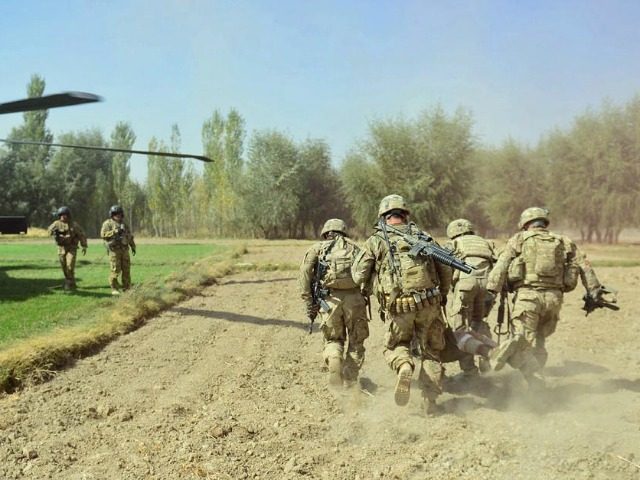The situation in Afghanistan is similar to Iraq: a premature troop withdrawal, conducted with great fanfare for political reasons by President Obama, has turned into a disaster. On Thursday, the White House concluded what the Associated Press (AP) describes as “months of debate” and gave U.S. commanders greater authority to conduct airstrikes against Taliban targets.
The AP writes:
Several officials said the decision was made in recent days to expand the authority of U.S. commanders to strike the Taliban and better support and assist the Afghan forces when needed in critical operations, using the U.S. troops already in the country. There is a broad desire across the Obama administration to give the military greater ability to help the Afghans fight and win the war.
It seems like only yesterday that the Obama administration’s “broad desire” was to get credit for bringing American forces home from Afghanistan. The “war” was supposed to be over, and President Obama’s confidence that the government in Kabul could take care of itself was absolute.
The AP writes that Obama’s decision to give American forces more “flexibility” to hit the Taliban is “ fraught with political sensitivities because President Barack Obama had made clear his commitment to get U.S. forces out of Afghanistan.” Unfortunately, that effort has been “stalled by the slow pace of the development of the Afghan military and the resilience of the Taliban.”
As with Obama’s quiet escalation in Iraq, after a much-ballyhooed “withdrawal,” operations in Afghanistan never really ceased, including U.S. special operators partnering with their Afghan counterparts, and U.S. airstrikes helping to protect endangered Afghan military positions.
The new orders for the military are portrayed as giving them greater latitude to more aggressively pursue the kind of support missions they have been conducting to assist government troops in Afghanistan. U.S. close air support will now be extended to conventional Afghan military units, instead of just their special forces teams. “This is not a blanket order to target the Taliban,” a senior U.S. military official told CNN.
Greater involvement by U.S. ground forces may very well be on the table, as there is talk of halting or reversing the withdrawal process. CNN also notes that U.S. “air controllers” may need to operate on the ground, to help coordinate the new airstrikes. For the moment, the Pentagon believes that American troops will not be in “direct combat” with Taliban forces.
According to CNN, the administration is also considering giving U.S. commanders the authority to hit Taliban targets that do not “pose a direct imminent threat.” This increased authority was reportedly to be announced Friday, but the plan was canceled at the last minute, for reasons not made clear in CNN’s report.
Reuters reports a “group of retired generals and senior diplomats” urging the President to scuttle his withdrawal plans, warning that it could “undermine the fight against the Afghan Taliban, whose leader was killed in a U.S. drone strike in Pakistan last month.”
“The Taliban control or contest more territory in Afghanistan than at any time since they were ousted by a U.S.-backed intervention in late 2001, and U.S. officials have acknowledged the uneven performance of Afghan security forces,” Reuters reports, adding:
Large portions of Afghanistan, including the provincial capital of northern Kunduz and multiple districts of southern Helmand province, have fallen, at times briefly, to the Taliban over the past year-and-a-half. Many other districts and provinces are also under varying degrees of Taliban control.
Furthermore, “the U.S government’s top watchdog on Afghanistan told Reuters that the United States had wasted billions of dollars in reconstruction aid to Afghanistan over the past decade, and now a renewed Taliban insurgency was threatening the gains that had been made.”
The Associated Press cites U.N. sources who say “3,545 Afghan civilians were killed and 7,457 wounded in 2015, most of them by the Taliban.”

COMMENTS
Please let us know if you're having issues with commenting.